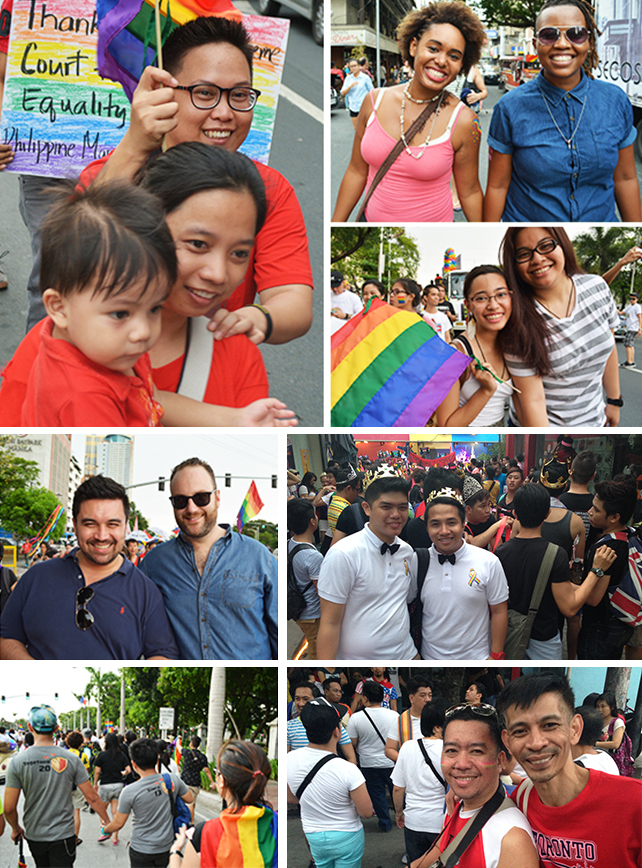TIME TO MAKE CHANGES.
LGBT people – particularly those in relationships – in the Philippines are set to question the country’s definition of marriage.
This came after the relationships of select same sex couples in the cities of Quezon, Baguio and Davao, and in Silang, Cavite were refused to be registered in their respective location’s civil registry after they simultaneously filed for marriage licenses that will give them legal recognition.
According to Atty. Clara Rita Padilla, executive director of EnGendeRights, this development is obviously discriminatory.
“The right to marry is guaranteed by our constitutional rights to equality, equal protection of the law, privacy, and religion,” Padilla said.

Sugar Ibañez: “Nais namin na maging legal ang same sex marriage sa Pilipinas dahil naniniwala kami na ang kasal ay para sa dalawang tao na nagmahahalan.”
PHOTO FROM SUGAR IBANEZ’S FACEBOOK ACCOUNT
DEFINING LEGAL ‘UNIONS’
Civil registration (a.k.a. “vital registration”) is the recording in the appropriate civil registers those “vital acts and events that affect the civil status of individuals.” These vital acts and events include: “births, deaths, fetal deaths, marriages, and all such events that have something to do with an individual’s entrance and departure from life together with the changes in civil status that may occur to a person during his lifetime”.
For Padilla, “limiting the right to marry to heterosexuals discriminates against LGBT people and denies people of different faiths and beliefs their right to marry. Recognizing the right to equality of marriage of LGBTs is an important step towards eliminating discrimination against LGBT people, paving the way towards a society where the LGBT people live a life of dignity and respect.”
Padilla is also a human rights lawyer who represented the Ang Ladlad in the Ang Ladlad vs. Comelec decision en banc by the Supreme Court in favor of LGBT party-list.
FACING DISCRIMINATION
In Quezon City, Maria Arlyn “Sugar” Ibañez, 33, and her partner Joanna Reena Gregorio, 31, applied for a marriage license at the QC Civil Registrar’s Office; along with Rev. Ceejay Agbayani, of the LGBTS Christian Church, and his partner Marlon Felipe.

Rev. Ceejay Agbayani: “Masakit ma-reject (It hurts to be rejected).”
PHOTO FROM REV. CEEJAY AGBAYANI’S FACEBOOK ACCOUNT
In a statement provided to Outrage Magazine, Ibañez said that she and Gregorio have been together for a year and a half now, with a “holy union”/commitment ceremony scheduled on August 16. “Nais namin na maging legal ang same sex marriage sa Pilipinas dahil naniniwala kami na ang kasal ay para sa dalawang tao na nagmahahalan. Karapatan din namin na maikasal at magamit ang benepisyo na nakukuha ng mga legal na mag-asawa sa ngayon. Patuloy kaming makikiisa sa pakikipaglaban na makamit ang pagkakapantay-pantay sa Pilipinas (We want for same sex marriage to be legalized in the Philippines because we believe that marriage is for two people who love each other. It is also our right to be married and avail of the benefits availed by the partners of people whose relationships are legally recognized. We join the fight to attain equal treatment for all in the Philippines).”
Meanwhile, for Agbayani, “masakit ma-reject (it hurts to be rejected),” he said, following the refusal of the QC Civil Registrar’s Office to grant him and his partner a marriage license. “Sinabi lang nila, plain and simple, na ang kasal ay para sa lalaki at babae lang. Kaya hindi puwede magbigay ng marriage license (They just said, plain and simple, that marriage is only for a man and a woman. So they couldn’t give us marriage license).”
For Agbayani, this is particularly “noteworthy” because Quezon City has an anti-discrimination ordinance (ADO), which is supposed to protect the rights of LGBT people in the city. “But of course we know that we’re dealing with a national law that is bigger than a city-wide ordinance.”
FIGHT GOES ON
With the refusal of the granting of civil registration to the LGBT couples, there is now plan to elevate the issue to the Supreme Court.
“There are LGBT people who belong to various religions whose unions were celebrated by their churches, and who now want to be validly married by their non-Catholic churches,” Padilla said.
Specifically, Article XV states:
Section 1. The State recognizes the Filipino family as the foundation of the nation. Accordingly, it shall strengthen its solidarity and actively promote its total development.
Section 2. Marriage, as an inviolable social institution, is the foundation of the family and shall be protected by the State.
Section 3. The State shall defend:
(1) The right of spouses to found a family in accordance with their religious convictions and the demands of responsible parenthood;
(2) The right of children to assistance, including proper care and nutrition, and special protection from all forms of neglect, abuse, cruelty, exploitation and other conditions prejudicial to their development;
(3) The right of the family to a family living wage and income; and
(4) The right of families or family associations to participate in the planning and implementation of policies and programs that affect them.
Section 4. The family has the duty to care for its elderly members but the State may also do so through just programs of social security.
It was only the Family Code of the Philippines that defined marriage as a “special contract of permanent union between a man and a woman”.
What occurred is therefore “important as a basis for further pro-same sex marriage lawsuits,” Padilla ended.


































































